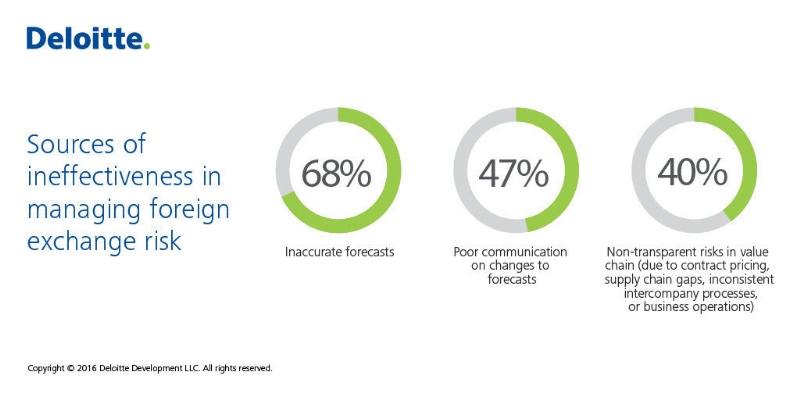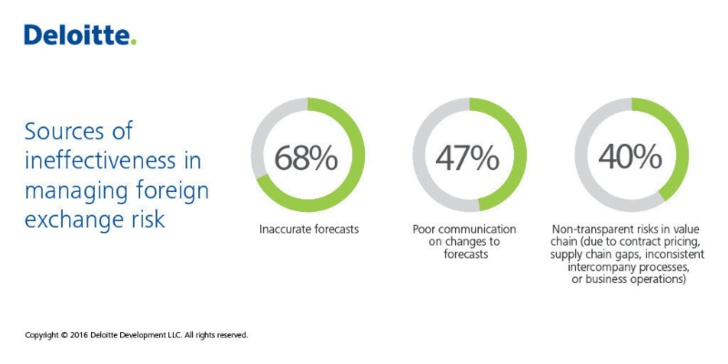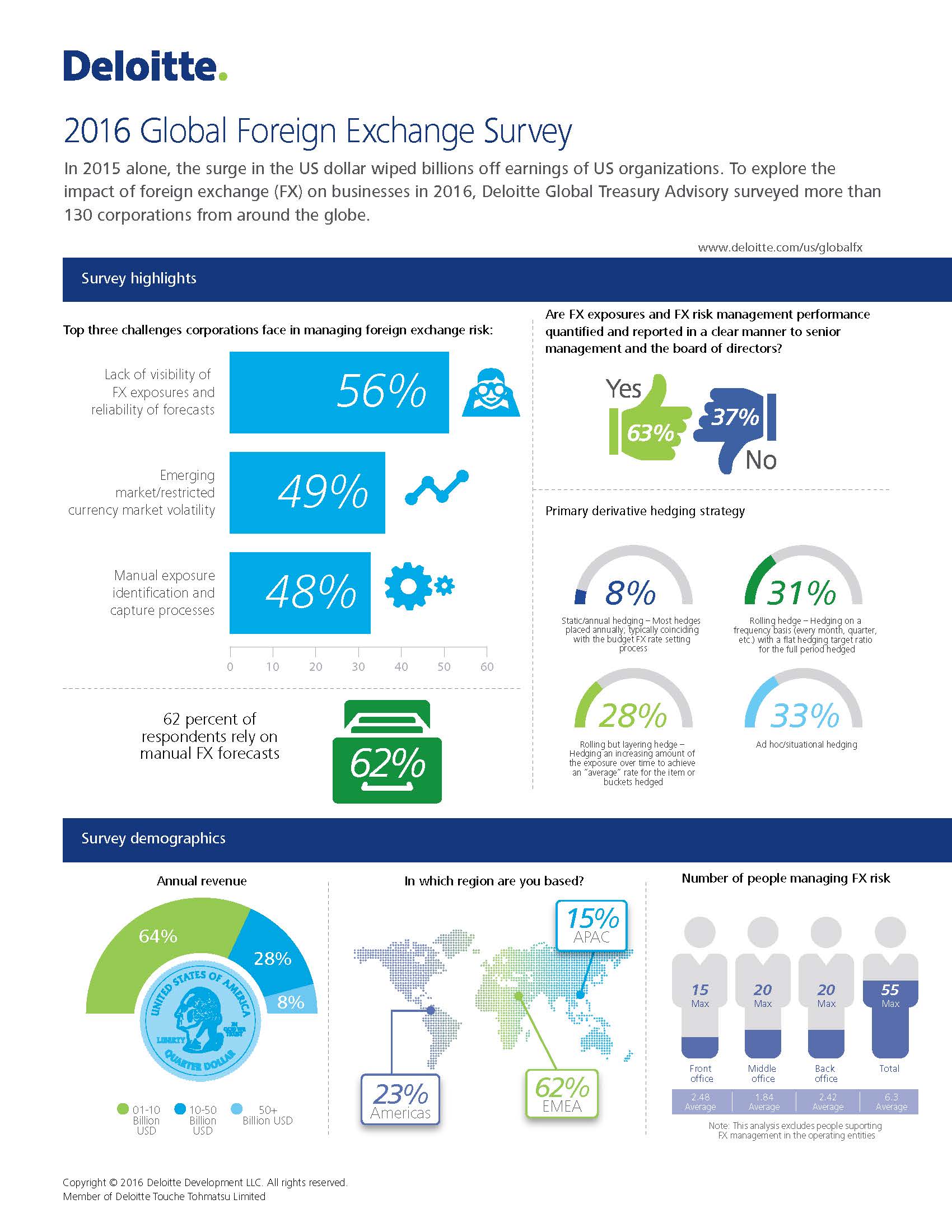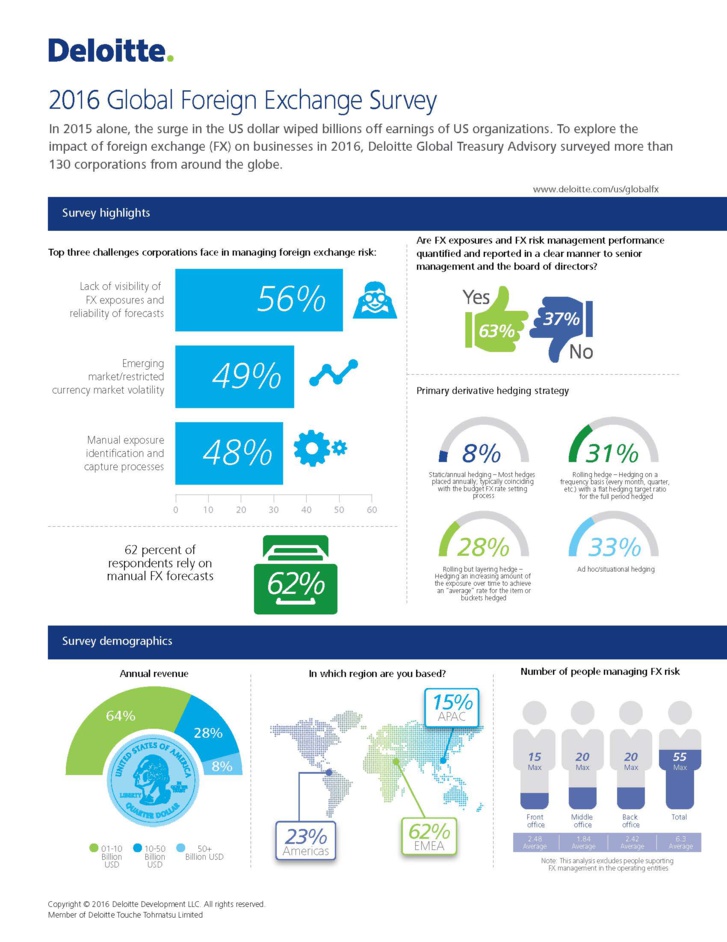The lack of visibility could stem from the fact that nearly one third (31 percent) of corporations rely on three or more sources to identify exposures.
"If you can't see it, you can't manage it. Without accurate measurement, value erosion from negative currency rate movements can't be anticipated or prevented. The challenges in reporting on FX risk have always been around but as companies become ever more international, and a period of relative calm in the FX markets has turned unsettled, this is likely to have an even greater impact," said Karlien Porre, partner in Deloitte UK's global treasury advisory services practice. "How can strategies be developed effectively if the exposure risk information is not being used to shape year-on-year performance as opposed to just the here-and-now? Only 11 percent of those surveyed cited managing year-on-year financial performance as a primary hedging objective."
While more than half of respondents (63 percent) feel that the board and executives receive sufficient information on FX exposure and risk management, only 41 percent report tracking impact on gross margin and other profitability measures such as earnings per share impact.
Nearly a quarter (21 percent) of respondents do not track FX risk management performance at all. Contributing to the challenge of identifying FX exposures is the lack of automation with 62 percent of survey respondents indicating that they use manual forecasts. In fact, inaccurate forecasts, poor communication on changes in the forecasts, and non-transparent exposures make up the top-three sources of ineffectiveness in managing FX risk.
"Chances are you are going to hedge less if you don't believe the forecasts. The survey findings show a direct correlation between levels of automation and confidence in these forecasts. Manual information and processes cause late and unreliable forecasts. Therefore corporate treasurers need to share these challenges with executives and global teams, along with a recommendation for investment in the tools and technology to alleviate the problem," added Niklas Bergentoft, director at Deloitte & Touche LLP, global treasury advisory services for Deloitte Advisory.
"Conversely, boards should push back on treasurers for greater visibility into stress tests, better staple reporting and more complex analysis. Companies could be taking a hit now by not supporting the need for treasury's roles to change."
The findings of Deloitte's 2016 Global Foreign Exchange Survey are consistent with the results of the 2015 Corporate Treasury Survey (2) where the need for better systems to bring exposure visibility and management of FX risk to the attention of boards was a key challenge a year ago. This year's survey also covers effectiveness of centralized and decentralized models, hedging strategies and transaction exposures, and was created in response to recent FX volatility impact on businesses.
About Deloitte Advisory
Deloitte Advisory helps organizations turn critical and complex business issues into opportunities for growth, resilience and long-term advantage. Our market-leading teams help our clients manage strategic, financial, operational, technological, and regulatory risk to maximize enterprise value, while our experience in mergers and acquisitions, fraud, litigation, and reorganizations helps clients move forward with confidence.
About Deloitte
Deloitte refers to one or more of Deloitte Touche Tohmatsu Limited, a UK private company limited by guarantee ("DTTL"), its network of member firms, and their related entities. DTTL and each of its member firms are legally separate and independent entities. DTTL (also referred to as "Deloitte Global") does not provide services to clients.
www.deloitte.com
(1) http://www2.deloitte.com/us/en/pages/advisory/articles/global-foreign-exchange-survey.html
(2) http://www2.deloitte.com/us/en/pages/risk/articles/2015-global-corporate-treasury-survey.html
"If you can't see it, you can't manage it. Without accurate measurement, value erosion from negative currency rate movements can't be anticipated or prevented. The challenges in reporting on FX risk have always been around but as companies become ever more international, and a period of relative calm in the FX markets has turned unsettled, this is likely to have an even greater impact," said Karlien Porre, partner in Deloitte UK's global treasury advisory services practice. "How can strategies be developed effectively if the exposure risk information is not being used to shape year-on-year performance as opposed to just the here-and-now? Only 11 percent of those surveyed cited managing year-on-year financial performance as a primary hedging objective."
While more than half of respondents (63 percent) feel that the board and executives receive sufficient information on FX exposure and risk management, only 41 percent report tracking impact on gross margin and other profitability measures such as earnings per share impact.
Nearly a quarter (21 percent) of respondents do not track FX risk management performance at all. Contributing to the challenge of identifying FX exposures is the lack of automation with 62 percent of survey respondents indicating that they use manual forecasts. In fact, inaccurate forecasts, poor communication on changes in the forecasts, and non-transparent exposures make up the top-three sources of ineffectiveness in managing FX risk.
"Chances are you are going to hedge less if you don't believe the forecasts. The survey findings show a direct correlation between levels of automation and confidence in these forecasts. Manual information and processes cause late and unreliable forecasts. Therefore corporate treasurers need to share these challenges with executives and global teams, along with a recommendation for investment in the tools and technology to alleviate the problem," added Niklas Bergentoft, director at Deloitte & Touche LLP, global treasury advisory services for Deloitte Advisory.
"Conversely, boards should push back on treasurers for greater visibility into stress tests, better staple reporting and more complex analysis. Companies could be taking a hit now by not supporting the need for treasury's roles to change."
The findings of Deloitte's 2016 Global Foreign Exchange Survey are consistent with the results of the 2015 Corporate Treasury Survey (2) where the need for better systems to bring exposure visibility and management of FX risk to the attention of boards was a key challenge a year ago. This year's survey also covers effectiveness of centralized and decentralized models, hedging strategies and transaction exposures, and was created in response to recent FX volatility impact on businesses.
About Deloitte Advisory
Deloitte Advisory helps organizations turn critical and complex business issues into opportunities for growth, resilience and long-term advantage. Our market-leading teams help our clients manage strategic, financial, operational, technological, and regulatory risk to maximize enterprise value, while our experience in mergers and acquisitions, fraud, litigation, and reorganizations helps clients move forward with confidence.
About Deloitte
Deloitte refers to one or more of Deloitte Touche Tohmatsu Limited, a UK private company limited by guarantee ("DTTL"), its network of member firms, and their related entities. DTTL and each of its member firms are legally separate and independent entities. DTTL (also referred to as "Deloitte Global") does not provide services to clients.
www.deloitte.com
(1) http://www2.deloitte.com/us/en/pages/advisory/articles/global-foreign-exchange-survey.html
(2) http://www2.deloitte.com/us/en/pages/risk/articles/2015-global-corporate-treasury-survey.html
Les médias du groupe Finyear
Lisez gratuitement :
Le quotidien Finyear :
- Finyear Quotidien
La newsletter quotidienne :
- Finyear Newsletter
Recevez chaque matin par mail la newsletter Finyear, une sélection quotidienne des meilleures infos et expertises de la finance d’entreprise et de la finance d'affaires.
Les 6 lettres mensuelles digitales :
- Le Directeur Financier
- Le Trésorier
- Le Credit Manager
- The FinTecher
- The Blockchainer
- Le Capital Investisseur
Le magazine trimestriel digital :
- Finyear Magazine
Un seul formulaire d'abonnement pour recevoir un avis de publication pour une ou plusieurs lettres
Le quotidien Finyear :
- Finyear Quotidien
La newsletter quotidienne :
- Finyear Newsletter
Recevez chaque matin par mail la newsletter Finyear, une sélection quotidienne des meilleures infos et expertises de la finance d’entreprise et de la finance d'affaires.
Les 6 lettres mensuelles digitales :
- Le Directeur Financier
- Le Trésorier
- Le Credit Manager
- The FinTecher
- The Blockchainer
- Le Capital Investisseur
Le magazine trimestriel digital :
- Finyear Magazine
Un seul formulaire d'abonnement pour recevoir un avis de publication pour une ou plusieurs lettres
Autres articles
-
Coinbase et Visa, un partenariat pour des transferts en temps réel
-
Brilliantcrypto, la nouvelle aventure play-to-earn basée sur la blockchain Polygon, arrive sur Epic Game Store
-
Nomination | Truffle Capital promeut Alexis Le Portz en qualité de Partner
-
IPEM Paris 2024 : 5500 participants au Palais des congrès
-
Pomelo annonce une Série A à 35 millions de dollars menée par Vy Capital

















